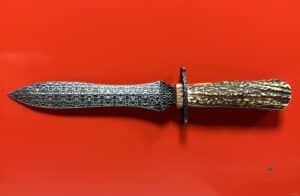Damascus steel is a type of steel, which was utilized to make sword blades crafted from wootz steel. These swords had unique patterns of banding and mottling that were similar to flowing water. They were also known to be tough and resistant, which enables them to be honed into very sharp edges. They were named after Damascus, the capital of Syria.
 The original technique for producing this kind of steel has been lost over the passage of time. Still, there have been numerous attempts at replicating it, but most have proved to be completely unsuccessful. This can be attributed to variations in raw materials and manufacturing methods used. Damascus steel has brought to life many legends such as its capability of sheering off rifle barrels or cutting hair strands falling across their edges.
The original technique for producing this kind of steel has been lost over the passage of time. Still, there have been numerous attempts at replicating it, but most have proved to be completely unsuccessful. This can be attributed to variations in raw materials and manufacturing methods used. Damascus steel has brought to life many legends such as its capability of sheering off rifle barrels or cutting hair strands falling across their edges.
History of Damascus steel
This type of steel was crafted in the New East from ingots of wootz steel, which were obtained from India and Sri Lanka. The Arabs introduced wootz steel in Damascus, a city that possessed a vibrant weapons industry. From the 3rd to 18th century, India was exporting wootz steel ingots to the Middle East.
However, the production of Damascus swords eventually declined and stopped altogether in the mid 18th century. The exact process of crafting these swords became a lost art to metalsmiths. This can be explained by the distance of trading in this kind of steel. A prolonged disruption may have been one of the main factors. Additionally, the requirement of trace impurities of tungsten and vanadium obtained from other production regions might have been a factor too. Also, the skill of effectively controlling thermal cycling following the initial forging process at a particular temperature, may have been lost. All of these factors prevented the occurrence of the famous Damask pattern that characterized Real Damascus steel.
Dave Bishop says
Mr Pendlay in Alabama successfully reproduced Wootz steel in small quantities, but it was still a bit hit or miss. He was working with a metallurgist whose name escapes me. I do not know what happened to the project after Mr. Pendlay died.
Dave Bishop